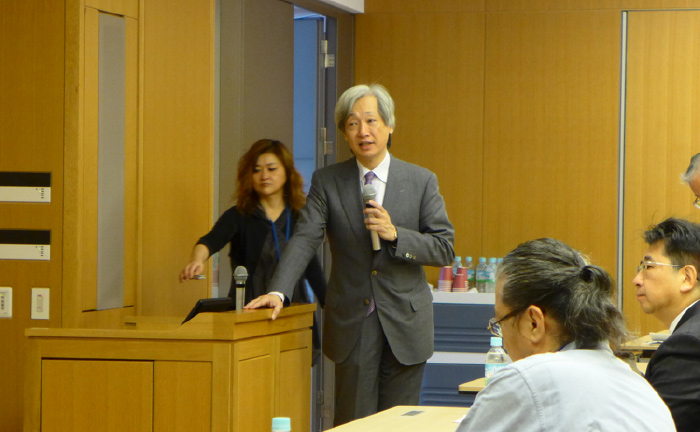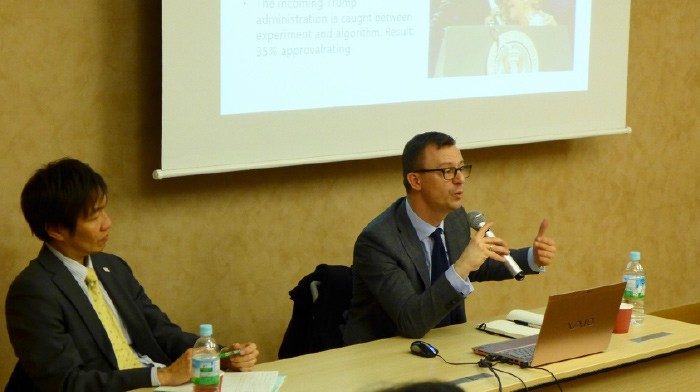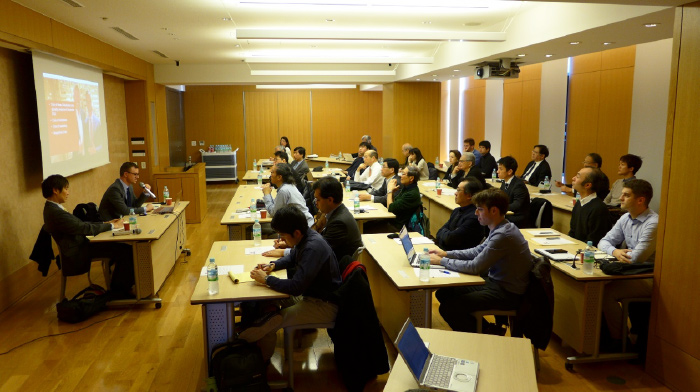SSU Forum with Professor Mikkel Rasmussen
| Date: | Tuesday, January 17 2017, 10:30-12:00 |
|---|---|
| Venue: | Seminar Room, 3rd Floor, Ito International Research Center |
| Subject: | Crisis and Cohesion:The Western Alliance and the End of European Integration |
| Lecture: | Professor Mikkel Rasmussen, University of Copenhagen |
| Language: | English |
| Co-hosted by: |
Security Studies Unit, Policy Alternatives Research Institute, the University of Tokyo, Graduate School of Public Policy, the University of Tokyo |
The Security Studies Unit was delighted to host a talk delivered by Mikkel Vedby Rasmussen, Professor of International Politics at the Department of Political Science, University of Copenhagen.
Professor Kiichi Fujiwara, Director of the SSU, introduced the event by recalling that this was the first SSU Forum of this year 2017, which appears already to be a year of great political change, very much reflected in the topic addressed by the guest speaker, namely the crisis of European integration and the shift in Western politics.

Professor Yee-Kuang Heng introduced the speaker as a leading European expert in security matters, coming from one of the most prestigious centres of international political studies in the continent.
Professor Rasmussen opened his intervention my thanking the hosts, and proceeded immediately to delivering an outline of his speech, which tried to provide an explanation of the momentous changes in the Western world, particularly following Brexit and the election of Trump as US President, and focusing on what appears to be the end of European integration.
Professor Rasmussen started by referring to different models of education as envisaged by the American thinker John Dewey. Dewey conceived educational paths as relatively open-ended experiences, as opposed to scripted algorithm-like learning activities. Similarly, one can conceive politics, and especially policy-making, as an open process of experimentation, or instead as the application to the reality of “scientifically” (i.e. positivistically, according to established nomological models) valid principles and agendas. How does this relate to international politics?

The current political situation can be explained as a consequence of the way in which the Cold War ended. In the 1970s, the West seemed to be mired in a severe crisis after the Vietnam War and the onset of severe economic problems. When Reagan was elected as US President, his ideas in the economic and security spheres appeared unconventional and quite experimental. However, he was eventually successful, and this led to the transformation of his pragmatic, contingent, experimental agenda, into an algorithm of propositions about how to manage both the economy and politics, with considerable disregard of most other factors. Recipes which seemed to be working for the context of the US in the early 1980s became the ideological basis for policy making extended to the whole of the planet, now opened up by the collapse of the Soviet bloc. That era lasted from the early 1990s at least to 2008, but it is now over. In a sense, globalisation ended on November 8th, 2016.
We find ourselves consequently in a crisis of ideas, we are therefore embarking in a new phase of experimentation, and Trump is an expression of this, and so Brexit. The crisis is however also extending to institutions, as mirrored in Trump’s remarks about the inadequacy and anachronism of NATO, and a crisis of leadership.
Professor Rasmussen highlighted on this latter point that one of the reasons of Clinton’s defeat was precisely that she incarnated an idea of leadership, and a way of doing politics, which was too familiar to the electorate, and which a vast part of the electorate no longer considers as viable.
Moving on to the crisis of the EU, professor Rasmussen stated that the EU is, in a sense, always in a crisis, and this has been the established way of functioning of that institution. However, the magnitude of the current crisis is such that the possibility of an institutional collapse cannot be completely excluded.
In a hypothetical Europe without the EU, Germany’s position will become even more crucial than today, but also more vulnerable, as Berlin’s power will trigger attempts at counter-balancing. Russia appears as the winner in this situation, as it role in European affairs in greatly enhanced. In many ways the Russians seem to have anticipated a global turn against globalisation by carefully reading and appropriating Samuel Huntington’s main idea underpinning the “clash of civilisations” argument, namely that the more different people interact, the more they discover that some of their differences are not bridgeable. This conception of international politics is the precise contrary of what is the central believe of the EU. Besides, President Putin of Russia clearly has been representing, for many years now, a completely different model of leadership, which is attracting an increasing number of admirers in the Western world.
Finally, professor Rasmussen remarked that one can see today’s Europe (and beyond) as a crisis society, the “bastard child” of what used to be called the risk society. How is it possible to deal with such crisis? At the moment the only way appears to be experimentation.

